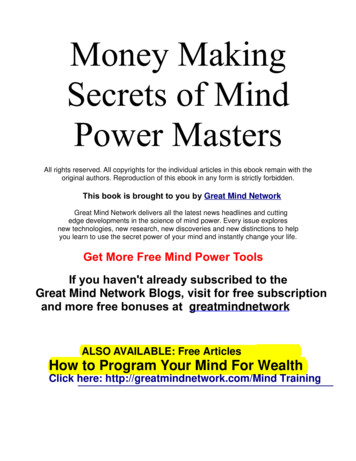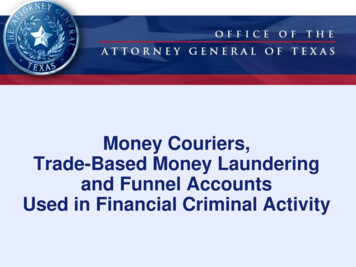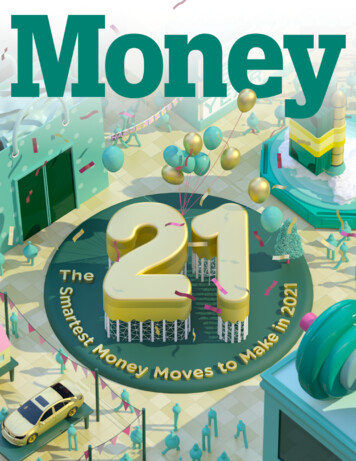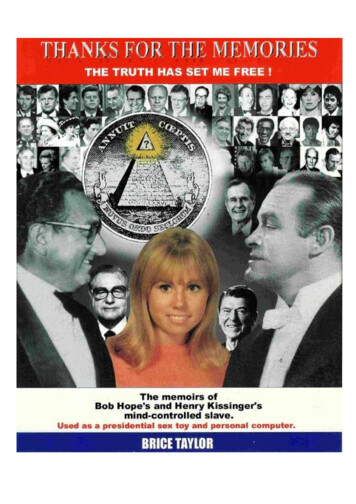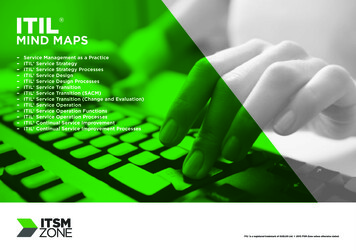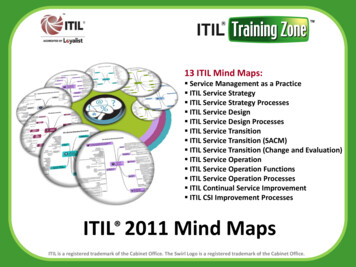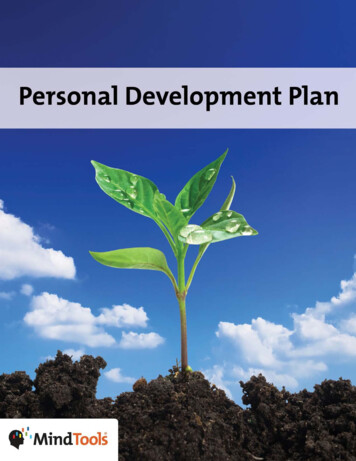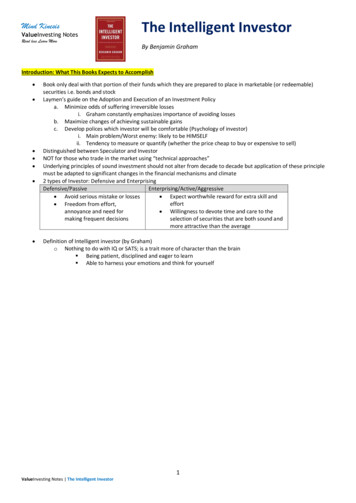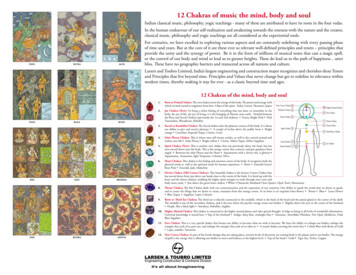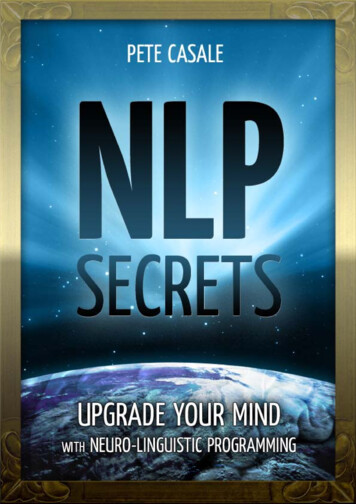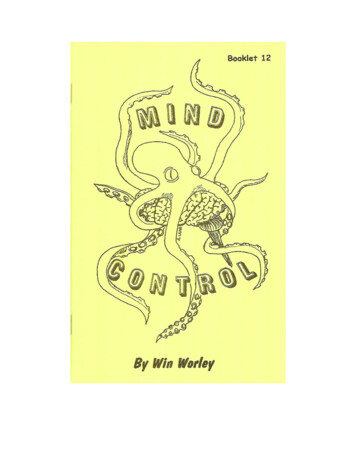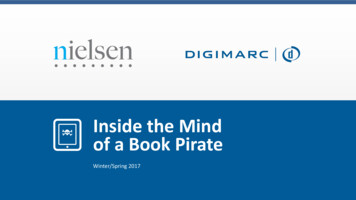
Transcription
MIND OVER MONEY:Change Your Thoughts,Change Your Financial FutureBy Hilary Hendershott, MBA, CFP
I’ve been a financial guide and advisor for women for more than 15 years now. In that role, I have the privilege of knowing the innerworkings of the financial lives of my clients, whom I respect and deeply care about. And because of those relationships, I also knowthat for a woman, having achieved wealth does not always lead to the experience of financial freedom.I found myself wishing that, along with a professional investment portfolio and trusted advice, I could offer my clients a transformationof thinking. I wanted to be able to set them free to enjoy their life, love, friendships, family and money freely and without reserve.Then, several years ago, after making my own money mistakes, I went looking for what scientists and brain researchers were sayingabout why smart, well-meaning people can still fail financially.I was surprised to find the answers to both of these questions in just one idea. I put them to use, and soon, Ihad both happier clients and fuller bank accounts.In this guide, you’ll discover the most important details of what I found.I was desperate, but I knew the answer had to be somewhere.What I discovered astounded me — I found that the academics and experts have already pinpointed the brain’s ability to processour understanding of money. They’ve already explained why some people are destined to amass fortunes and others, ifleft to their own devices, are doomed to failure. This information is already known, but not understood, and certainly not being taughtwidely to the people who really need it.I used what I had learned to transform my own financial life.When I finally stopped worrying, I felt confident, and knew the steps to take so that I could rebuildmy wealth and grow a successful company.I trademarked the phrase Money Operating System , to describe what I had found.
Your Money Operating System controls your entire financial life.What you think about money controls what you buy, what you spend, how you save and invest, how you interact with others who havemore and less than you, and how you think and feel about yourself in all of this.Maybe you think of these as “money blocks” or “limiting beliefs” or your “money mindset”—it’s all essentially the same thing, but this MoneyOperating System Technology TM takes it a step further in isolating, understanding, and gaining power over it.If you see it for what it is, you can finally overcome it.In your life, you’ll gain control and the ability to make conscious choices, increase your income, your wealth, expand your confidence, andtruly enjoy financial freedom.That’s the big idea.A NOTE FROM THE AUTHOR:I first spoke publicly about the Money Operating System in my TEDx talk which was called The Surprising Power of Language to MakeYou Rich.This guide integrates all of that research and content, as well as new and valuable distinctions that will help you identify the systems youcurrently have in place in your life that are preventing you from producing any new result, until now.If you read the guide and complete the worksheets and exercises at the end, you’ll have drawn a complete picture of the system you’vecreated that is your financial life.When I work with clients, I help them introduce a brand new money system—one that works.New systems, habits and beliefs are critical to financial transformation simply because you’ve got to replace what’s already there.I’ve yet to meet a human being who wouldn’t be willing to become someone who receives and keeps more wealth in their lives, and thatdoes happen as a result of this work for both me and my clients.And what’s also possilbe is achieving financial maturity—real and experienced security, freedom and peace of mind.That is the work I hope we’ll do together.HILARY HENDERSCHOTTFINANCIAL3
INTRODUCTIONAs human beings, we are systems unto ourselves. We workin a complex community of relationships that allow us tointerrelate and create our lives. We interact with other humanbeings and create our experience of life.We connect through these systems. Thoughts are transferredfrom one human being to another. We learn. We exchange.Inside this exchange—this idea of connection is this idea that,for conscious human beings, a life of success and achievement is often (soon) devoid of satisfaction.I assert it isn’t possible. If I’m not successful, you aren’t successful. If you’re not successful, I’m not successful. We riseand fall together.One world. One human race. One air supply. One watersource. One atmosphere. One gravity.But how we talk about this oneness—well, that happens inlanguage.Once our cups are full, we can live alone at the top for abrief moment in time, and then we become aware of what’sleft—the communities and people we care about and ourneighbors who live with less.Connection to that suffering brings back an awareness of theache left inside—the yearning—to make an impact—to makea difference—to do a human something about the state ofthings beyond our personal worlds. The great human hoax isthat one human being can be successful.HILARY HENDERSCHOTTFINANCIAL4
THE LANGUAGE OF YOURMONEY OPERATING SYSTEM We think the language we use is a reaction to our world. Werelate to the things we say about life as though they are anaccurate description. For example:“It’s 3 o’clock”Dr. Lera Boroditsky, a Stanford Psychologist, has shown thatlanguage doesn’t just express otherwise universal thoughts,language gives rise to our thoughts. Her work has shownthat if you change how people talk, you can change how theythink. If people learn another language, they also learn a newway of looking at the world. When bilingual people switchfrom one language to another, they report that they startthinking differently, too.“I can’t afford it;”I became very interested in how language was creating myworld when I suffered near financial tragedy in my twenties.I graduated from college during the height of Silicon Valley’sDot Com Craze in 1998 and was earning six figures withinjust a few years. But I spent every penny, and somehow myexperience was ALWAYS that there wasn’t enough.And, for the most part, the scientific and academic communities have agreed with this assumption—that our descriptionsare results of the world around us and that they’re largelyaccurate.And I was frustrated. How does an educated person withgood intentions fail to produce positive results? How did I,who had so much, still experience the world and my accomplishments in it as not enough?Let’s examine that, though.At the same time, I was getting my start as a financial advisor and began my one-on-one work with affluent clients millionaires and multi-millionaires.“The floor is dirty”“He’s not nice”Now, neuroscience research is finding that, at least in someareas, our language actually gives rise to our experience,thoughts and actions. Even though it seems obvious that weare describing our world, sometimes our language createsour world.Over time, I started getting to know my clients. And I realizedthat many people who are wealthy still struggle with money.Some millionaires have an irrational fear of running out ofHILARY HENDERSCHOTTFINANCIAL5
money, some have shame about being wealthy, and stillothers destroy precious relationships over money.Then, there are people, some of whom have less money, whoare confident, rational and peaceful about it.experience some happy memory of the past, time spent withloved ones or an especially exhilarating experience—a senseand space of fulfillment. An experience of joy. Maybe evena generous feeling welling up—like “ohhh, I’d like to do thatagain.”I was fascinated.Language gives rise to experience.It turns out that one area where language is particularlydefinitive is in describing concepts, things that can never beseen, touched or tasted.HOW YOU LEARNEDABOUT MONEYTime is an example of something that is entirely conceptual.So here are things we often say about time:“I don’t have time.”“Time flies when you’re having fun!”Just like time, money is also largely conceptual. It only actuallyexists in language. We think cash is money. But cash is just a representation of money. Actually, an increasing number of retailersdo not accept cash, and if you don’t believe me, try paying cash fora cocktail on any commercial airline flight.Nope. Cash is not money.Both of these statements refer to the experience of timemoving quickly. Yet, notice when you read the first statement,you probably experience some form of frustration, anxiety,pressure or perhaps confinement—some closing in—somelack—some sense that there is not enough.And when you read the second statement to yourself, youMoney is not the numbers you see in your bank balance.Your credit card does not physically contain money.Further, gold is not money and checks are not money.HILARY HENDERSCHOTTFINANCIAL6
We cannot actually see or touch money, because money is just apromise, delivered in measurable units that can be transferred atthe connection of exchange for something we want, we value, weneed.And I submit to you that that is the ONLY thing that is fundamentally true about money. But we don’t live like that, do we?Most of us live like money and wealth have intrinsic meaning, butthey don’t. Money has a role in your life, a job, but it doesn’t haveintrinsic meaning.When you were a child, money didn’t exist for you until it did.Money is a human construct, a mutual agreement reality thatadults participate in, so it was tough for you to grapple with itsintangible nature.You were a blank canvas, but not for long. As you reached forunderstanding, your mind sought out and replaced lack of understanding with what the environment provided—a superstitionabout money, a belief about what money is.The first thing your young mind found to be true about moneybecame your Money Operating System .Money is conceptual, and the young mind seeks to translate theconceptual into something it can understand.The formative mind might as well be saying, “I know I can’t understand what money is, so at least give me something I can know tobe true about money.”And at that moment of translation from concept (nothingness) tosuperstition, human beings get stuck.You got stuck with a Money Operating System .Once belief is operating, it is, in fact, a kind of programming language upon which all the money concepts are coded.I call this your Money Operating System —and you can’t do anything about it until you understand that it is now installed and incharge.This operating system (as with the computer you connected withme on) draws its power from your belief and impacts every dayexchanges.This belief has now been installed as dominant across your entirefinancial landscape. The amount you save, the amount you spend,whether you invest, how you invest, how you negotiate for asalary, and how you feel about all of that is informed and controlled by that overarching belief that you, unwittingly, installed asboss.This belief might have been handed down through generations.HILARY HENDERSCHOTTFINANCIAL7
It’s almost certainly informed either by a story you were told oroverheard about money, or by a story you told yourself aboutsome experience you had that involved money.It’s not easily discovered. When you go looking for it, it’s like the airthat you breathe or the water that you swim in. It is a basic statement or assertion that you not only believe to be true, but is theway your money options are defined and controlled in your world.It’s your Money Operating System . It’s pre-coded. It determineshow you access and interact with the wider world.Here are five common Money Operating SystemsTM I see.5 COMMON MONEYOPERATING SYSTEMSTMFor example, I once met a man with this Money OperatingSystem who had just retired at age of 66 and was absolutelyconfident about his financial security. He only needed 50,000per year to live on, so he was shocked when I told him that the 120,000 in his savings accounts was likely to fund less than threeyears of retirement income.2. If I am good, the universe will give me what Ineed.While I do think this is a positive world outlook, it doesn’t tend tolead to productive financial behavior, like saving and investing,because these folks believe that their financial health is a functionof virtuousness.This Money Operating System often exists for people in conjunction with a religious belief system.1. There will always be enough money.3. Money gives me value./Money makes mepowerful.People with this belief can be high earners, sometimes they aresalespeople or their compensation is somehow performancebased. But sometimes they’re average earners who live simply,so they just don’t realize how much money they actually need tosave, and they need to be careful about being lulled into a falsesense of security around money.These people have money very intertwined with their self-worth.Other people often perceive them as powerful around money andbusiness. If they are successful, their ego and confidence growwith their bank account. If they are unsuccessful at producingresults, their confidence suffers and people can spiral downward. Interestingly, I when I discovered my own Money OperatingHILARY HENDERSCHOTTFINANCIAL8
System , I found that I two running my show. This was one ofthem.4. There will never be enough money.Pretty self-explanatory, and this actually was my other MoneyOperating System . It co-existed very destructively with “Moneymakes me valuable”.It’s unfortunate that I ended up with two that so obviously contradict one another, because as I was manifesting the Money OSTM“There will never be enough money” by overspending my income,my confidence was plummeting because I didn’t have any moneyleft to prove my value.5. Money is bad/the root of all evil.People with this belief conflate social problems with the fact thatwe live in a capitalistic society. They find virtuousness, if not righteousness, in living without a lot of material possessions, and arevery successful at finding evil rich people to vilify. Their negativeopinion of money leads to destructive financial behavior.These are just some of the Money Operating SystemsTM I’ve seenand discovered in my work with clients.I work with clients to identify their money beliefs so that they canremove money blocks and finally build wealth and create financialsuccess for themselves. It’s very common these days to talk aboutthe emotions of money, but that conversation is not complete without understanding the power of the Money Operating System .Your own Money Operating System might be something different. Whatever it is, the core of it will be in very basic languagebecause you created it as a belief you could understand whenyou were a child. You may have something very sophisticatedsounding that you say to yourself or other people NOW, but that’salways on top of something pretty elementary.THE WORLD OF THE MONEYOPERATING SYSTEM Your brilliant mind is very effective at not only gathering evidencefor what it believes, but at creating situations that reinforce it. Soyou’ll have complex patterns of behavior and dialogue that keepthese situations in place. A network of behavior that producesresults that reinforce your belief.It’s a belief and your belief created the system.When you commit to the Mind Over Money Journey, and can movepast the limitations of your belief system, you learn to act strategically and heed the lessons of your own psychology.HILARY HENDERSCHOTTFINANCIAL9
place of a history of daily thoughts, feelings and rituals that, untilnow, just seemed like how things had to be.You learn behavior modification.Then, with good planning and execution, you can experience themiracle of compound interest working with your actual regularsavings plan—and, no matter the number you need, it works tohelp you achieve your financial goals.Most people I meet would love to shift or change their experienceof money in some way. Most commonly, people find they’d like tobring in more money or just keep more of the money they’re bringing in.Sometimes the shift around money that would make the mostdifference is emotional—finding courage, healing old wounds,accepting the challenge to become economically independent,experiencing being worthy of wealth.Whatever your call to greatness, this guide is a critical componentto understanding the YOU that created your current financial condition, and establishing the YOU that will eventually prevail.True transformation is enabled by mastering the Money OperatingSystem distinction, and the remainder of this document containsworksheets and exercises that will have you reveal to yourselfwhat was previously hidden.Discovering your own money systems will give you tremendousinsight and help you see an entire world of new possibilities in theONLY ACTIONS MATTERI cannot overstress the importance of taking new actions to alteryour financial reality. If you simply read this guide and put it away,without doing the exercises and without taking new action in yourlife, your financial realities will continue, unaltered.The insights you’ve gained and will gain from this guide will notcause you to feel confidence enough to raise your prices or ask fora raise. New thoughts will not bring comfort where there is suffering or peace where there is regret. Only new actions will bring newthoughts and feelings. You must act, often in the face of, or despitea lack of inspiration.In the first few months and maybe even the first year of my ownfinancial turnaround, I felt no inspiration. No new energy fuelingmy new behaviors. It often felt like drudgery. There was only adecision that I was never going back to that place, and a knowingof the actions it would take to get there. I lived in that decision.And then, one day I woke up and the debt was gone. Soon, retirement savings was rebuilt. Now, I own a woman-centric businessworth more than a million dollars and growing. True financial fitness and financial freedom!HILARY HENDERSCHOTTFINANCIAL10
My current financial realities are a world away from where theywere. My thoughts and feelings have followed suit: I experienceconfidence, freedom and joy—but I needed to produce a history ofnew actions to generate the new thoughts and feelings.Remember, these exercises are for you. Answering them as honestly as you can will help you to gain the truest perspective onwhere you are now, so you can begin making real progress towardthe financial future you deserve.The choice is yours, but if you are interested in a financialtransformation, take new actions today.After you’ve completed the exercises, save them to a file on yourcomputer labeled “My Money OS”.“Excellence is never an accident. It is always the result of highintention, sincere effort, and intelligent execution; it representsthe wise choice of many alternatives – choice, not chance,determines your destiny.” AristotleAnd if you want ongoing insights and new training opportunities,by all means, subscribe to my podcast on iTunes.“A real decision is measured by the fact that you’ve taken anew action. If there’s no action, you haven’t truly decided.” Tony RobbinsThe following exercises are designed to help you take the smallactions necessary to cement your decision to change your financialdestiny.You don’t need to do all the exercises at once, but I highly recommend setting aside an uninterrupted block of time to go throughthem. In some cases you’ll want to think through your answers. Inother parts of the exercises, you’ll want to be very spontaneousand respond with the first thing that pops into your head.HILARY HENDERSCHOTTFINANCIAL11
MONEY OPERATING SYSTEMTM EXERCISESWhat are your formative or first memories of money?How was money talked about and handled in your family as you were growing up?HILARY HENDERSCHOTTFINANCIAL12
What was your parents’ attitude toward money?What have you done with your own money as a way to either mirror or reject the wayyour parents were with money?HILARY HENDERSCHOTTFINANCIAL13
Would you say you have a positive or negative relationship with money?Describe money—what are its characteristics to you?For example: Money is hard to get. Money makes drama. Money makes people sexy and powerful. Money seems to alwaysshow up mysteriously. I don’t like what money does to people. Money just is. Money could run out. Money is a means to an end.It represents food, shelter, fun, etc. It can make life easier, more convenient or the lack of money can make life more stressful.HILARY HENDERSCHOTTFINANCIAL14
CIRCLE THOSE THAT APPLY TO YOUIf you circle three or more of the following, at least one of your Money Operating Systems is likely related to the statementabove the list.If you have a scarcity-based Money Operating System such as “There’s never enoughmoney”: You don’t know how much money is in your bank account. When you think about looking, you get emotional. You’re not earning what you think you should be earning. Money burns a whole in your pocket. You buy things you know you shouldn’t. You sometimes make agreements to pay for things that you break. You say things like “I can’t afford that.” You overdraw your bank accounts. You have financial emergencies. You have chronic debt. Wealth and Financial Freedom seem out of reach.HILARY HENDERSCHOTTFINANCIAL15
If you have a normative Money Operating System such as “Money is bad”: You don’t know how much money is in your bank account. When you think about looking, you get emotional. Deep down, you think having money or wanting money is bad. You think rich people are greedy, evil, materialistic or selfish. You live paycheck to paycheck. You think being broke is virtuous (even if you don’t want to think that).If you have a perfunctory Money Operating System such as “Money is a tool” or“Money is a resource”: When you need more money, you find ways to get it. You generally always save, and you feel like you are on track for Financial Freedom. You follow the rules of money. You put some of every paycheck in retirement or other savings accounts. You have a hard time making large purchases, such as a new car.HILARY HENDERSCHOTTFINANCIAL16
If you have a dissociative Money Operating System such as “Other people will takecare of me” or “Money just shows up” or “If I’m good, the Universe (or God) will give mewhat I need”: You know you can get money from others, like your parents, if you ask. When you need money, someone gives it toyou. You’re not saving much at all for Financial Freedom, in fact, you don’t really think about that because it’s probablygoing to be taken care of by someone else. The way you handle money makes it obvious that you are thinking and planning for today, but not the future. You love the idea of spoiling yourself. You believe that if you are a good and virtuous person, everything will work out for you financially. As things stand right now, you think you probably wouldn’t make a good financial partner for someone.If you have an over-confident Money Operating System such as “Money is no problem”or “There’s always enough money”: You make good money and you save it. You find it difficult or unnecessary to talk about the details of it with anyone, including your spouse or partner. You feel confident, maybe even arrogant, about your money habits. When the people you love need something, youmake it happen, but you’re aware there are trade-offs. (continued on next page.)HILARY HENDERSCHOTTFINANCIAL17
(continued from previous page)If you have an over-confident Money Operating System such as “Money is no problem”or “There’s always enough money”:If you’re honest, you’ve never actually done any mathor worked with a professional to see where you are in relationship to your goals. You don’t worry about money. You are generally always willing to spend money. When it comes to expenses shared with friends or family, you’d much rather just pay for something than have anykind of drama or upset about it from anyone else.If you have a self-punishing Money Operating System such as “I’m just not good withmoney”: You believe you’re not good with money. You believe you aren’t good at math. You aren’t sure at all how much you have or how much you spend. Talking and thinking about money really overwhelms you. You might be an artist or a creative. You wish someone else would just handle your money for you.HILARY HENDERSCHOTTFINANCIAL18
If you have a chaotic Money Operating System such as “Money is complicated”: You have money drama with the people in your life, especially family members. You might share money, property ownership, business ownership or other money-related interests with friends orfamily members. These intermingled interests don’t always go well but you feel you can’t distance yourself or exit thepartnerships. There might be lots of money in your family. You harbor bad feelings about other people and the way they are with money. You feel others have done you wrong financially or that you can’t live the life you really want to live because of financial entanglements.If your Money Operating System is “You have to work hard for money”: EITHER: You work really long hours, probably don’t feel that you are compensated generously, and sacrifice important things in your life for money. Other people think you work too much. OR: You refuse to work harder than youdo, because you choose “balance” or “quality of life”, but you’re not earning near enough money to fund today andtomorrow. You feel righteous/indignant about whichever of the above choices you have made. The idea of generating a high income and still having a life you love seems out of reach to you. EITHER: You’re not saving enough. OR: You’re saving, but you’re totally overworked and exhausted.If your MoneyOperating System is something different, write down what it is here:HILARY HENDERSCHOTTFINANCIAL19
If your Money Operating System is something different, write down what it is here:HILARY HENDERSCHOTTFINANCIAL20
IN CONCLUSION If you’ve read this far and completed all of the Money Systemsand Money Operati ng SystemsTM exercises, congratulations. I’msure at this point you’ve had insights into your money life that arenew. For most, this is a fairly emotional experience. You might findyourself inspired for change, frustrated at lack of results, or evenresigned because you’ve always had a sense that money mistakeswere your own doing but no sense of how to change them.Again, I get it.You’ve received this eBook as my free gift to you. If you want tocontinue on your path to financial transformation, I invite you tomake that decision today! The past is the past and all you cancontrol is the future. YOU are in the driver’s seat!After all, this is the most empowering truth about life—“If it is tobe, it is up to me.”So, decide. Decide today, now, that your future doesn’t have tolook like your past. Decide that you are going to create financialfreedom for yourself. Now that you understand the faulty systemsthat have been in charge, you can leave them behind and createnew ones. Oh, sure, it might feel painful and slow. It doesn’t haveto, but it might. But just remember, you have decades of experience in empowering the belief you got stuck with when you werelittle. Now it’s going to take some time to rewire all of those neuralpathways! Have patience. Be compassionate with yourself. Getsome buddies to support you.And that is just ONE of the things I have to offer you today.To move you forward into the life you most want, I’ve included heresome suggested habits, practices and specific steps you can takethat I’m sure will get things moving in the right direction.Here are the actions I recommend you take now:1. Make sure you’re subscribed to Profit Boss Radio. Profit Bossis a weekly show where I interview topic experts who willshare with you their best practices, every day people with realmoney stories to tell, and occasionally offer my own teachingand wisdom from 15 years of working closely with clients toimprove their money life. This is your Women’s Wealth Mastermind! It’s a place where we are having the talks that nobodyelse is having about money. You can count on getting the realdeal from Profit Boss Radio.How to subscribe to a podcast: Find directions on my websiteat hilaryhendershott.com/podcast2. Connect with the live mastermind Profit Bosses in my privateFacebook group here. This is where you can ask questions andget live support about what you’re learning in Profit Boss. Justrequest admission and you’ll get it! I promise! My team and Ipersonally curate the conversation to ensure it stays supportive, welcoming and valuable.3. Are you considering hiring a financial advisor? I specialize inoffering Personal Chief Financial Officer services to womenwho have a million dollars or more to invest. If this is you, or ifyou are well on your way there, and would like to schedule a15-minute call to discuss how you can grow your wealth andexpand your financial freedom this year, please email us atHILARY HENDERSCHOTTFINANCIAL21
Hilary@HilaryHendershott.com or call 877-569-5508. I lookforward to connecting and discovering if I might be the rightperson to partner with you to achieve the things you mostwant to achieve.And thus, if I have earned your trust, when it comes time to chooseto invest in yourself and building your own Financial FreedomSkills, you’ll feel confident that the investment is well worth it.I offer various coaching and training programs. By being connected via email, Facebook and on the podcast, you’ll be sure to benotified of when registration is open.Now, my friend, we know each other. Now I can call you “friend”and you call me the same. I’ll also call you a Profit Boss—and aProfit Boss is someone who puts herself in charge of her ownmoney life.Most of the world has no idea that there are SEVEN specific skills,learnable traits
understanding, your mind sought out and replaced lack of under-standing with what the environment provided—a superstition about money, a belief about what money is. The first thing your young mind found to be true about money became your Money Operating System . Money is conceptual, a
